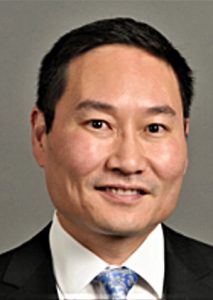[Interview with LA County Deputy Chief Prosecutor Paul Kim]
Can hate crimes based on race, religion, or skin color truly disappear in a multicultural city like Los Angeles?
Paul Kim, Deputy Chief Prosecutor of the Organized Crime Division at the Los Angeles County District Attorney’s Office, believes that strong prosecution efforts will prevent a rise in such crimes.
Kim is a veteran prosecutor with extensive experience in gang and organized crime cases, and he is a graduate of UC San Diego and an alumnus of UC Davis Law School. He joined the LA County District Attorney’s Office in 2000. Over the years, he has gained experience across major divisions, including a nine-year stint in the Gang Investigation Unit, during which he prosecuted more than 30 homicide cases.

Currently, Kim leads a team of eight in the Organized Crime Division, working closely with major law enforcement agencies to prosecute organized retail theft rings and other criminal networks that have been on the rise in recent years.
Kim explains that hate crimes, like organized retail theft, often involve criminal organizations with clear motives.
“Most anti-Asian, anti-Semitic, and anti-Black hate crimes are orchestrated by groups with explicit motives. In such cases, they are classified as felonies and prosecuted accordingly,” he said.
According to Kim, the definition of hate crimes is broader than many people assume.
“A hate crime is any act in which a specific group is targeted because of a particular characteristic,” he explained. “It’s not just about a ‘majority group’ targeting a ‘minority group’—hate crimes can occur in any direction.”
Although suspects often deny intentionally targeting a specific group, it is Kim’s team’s job to gather evidence and prove these cases in court.
According to surveys, two out of three Asian Pacific Islanders reported experiencing hate crimes during the pandemic. However, Kim points out that filing charges requires thorough verification and legal procedures.
“There’s a difference between a hate crime and a hate incident,” he clarified. “Hate incidents—such as racial slurs or derogatory remarks—don’t always meet the legal threshold for a crime. Hate crimes, on the other hand, involve clear intent and direct harm beyond just an offensive statement.”
While official hate crime statistics for 2023–2024 are yet to be released, online reporting systems and heightened police involvement have likely contributed to a decrease in incidents.
Additionally, law enforcement agencies now consider hate crimes as serious offenses, leading to expanded investigative and prosecution teams.
Kim emphasized that hate crime prosecution efforts have significantly increased.
“Whereas two or three prosecutors used to handle these cases, we now operate with an entire dedicated team, which shows just how seriously authorities are taking this issue,” he said.
He also highlighted District Attorney Nathan Hochman’s commitment to combating hate:
“DA Hochman believes that hate is something people can easily learn from a young age, which is why he personally visits schools to emphasize the importance of prevention and education.”
Regardless of whether an incident qualifies as a hate crime or hate incident, Kim stresses that reporting is crucial.
“If crimes go unreported, law enforcement and prosecutors have no way of understanding the reality of what’s happening in the community,” he warned.
Residents are encouraged to report hate crimes by calling 211, ensuring that authorities remain informed and can take action against these offenses.
BY BRIAN CHOI [ichoi@koreadaily.com]





